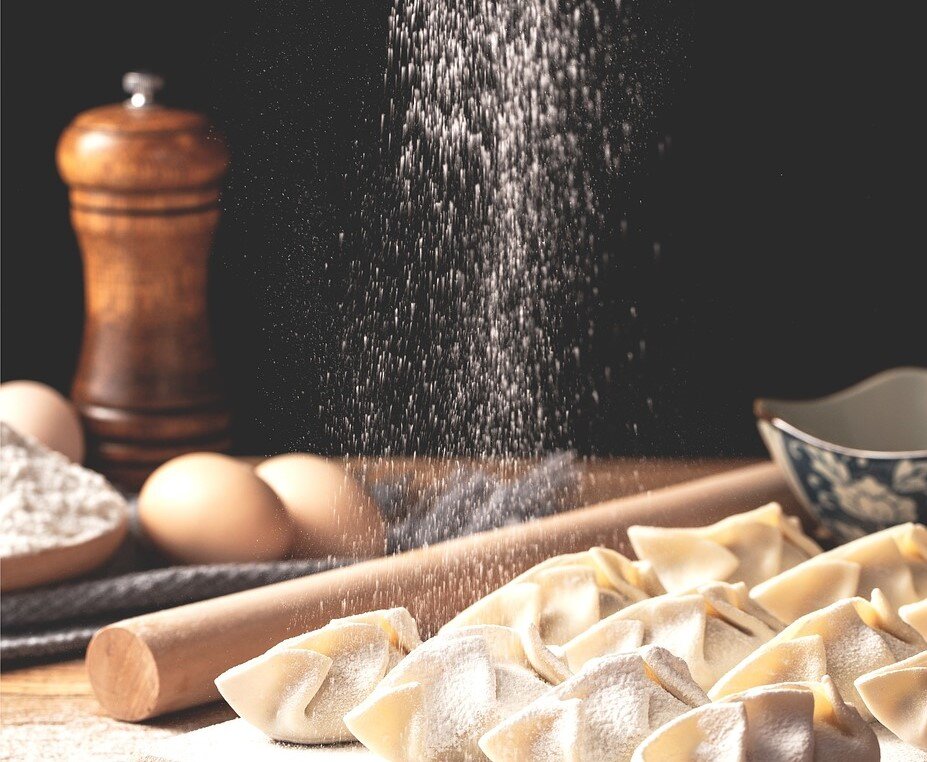
How Not to Take Holy Communion
Part 5 – The Mystery of Reba’s Overnight Rolls
There’s something about Hoosier grandmas (and maybe specifically German Hoosier grandmas), that is a bit mysterious regarding their wonderful cooking. My wife Sheila’s paternal grandma Reba Reichart made these wonderful rolls which we usually tasted at Thanksgiving. The only thing I really know about the recipe is it involved butter and flour, and beyond that I never tried to even examine what she included or how it was mixed. In my house the mystery was grandma Graf’s pancakes. The pancakes were easier to track because you could actually watch her make the batter and be eating the pancake within minutes (nothing snuck past the eater, but I never equaled her pancakes).
But Reba’s overnight rolls took too long to observe the entire process, so we always had a theory that grandma did something cryptic in the middle of the night as she let the rolls sit in the refrigerator. We never discovered the secret. She popped them in the oven on Thanksgiving, and there was no parallel to the flavor and texture.
Countless granddaughter’s attempted to duplicate the rolls, and I suspect my wife came the closest – to my knowledge. Now we all wonder… Just what was her secret, and do we have all the ingredients or was there something missing?
As St. Paul describes to the Corinthian church the ingredients of a proper celebration of Holy Communion, he lists various problems in their celebration of the Eucharist which the last 4 devotions covered: division in the church, misguided motives, forgetting forgiveness, and intoxication. But the last reason is the most elusive ingredient: how to mix the many key components together.
St. Paul’s list of essential ingredients – that are necessary to have a true “Lord’s Supper” – covers 9 verses (I Corinthians 11:23 – 31).
There was a continuity of these ingredients passed down “received from the Lord… also delivered to you.” (v.23) In one sense, there is no mystery to this ingredient list. The Church has been sharing it in an unbroken fashion from the institution of Christ the night of Passover (Good Friday) up until now. The ingredient list is clear: “He took bread; and when He had given thanks He broke it and said, ‘This is My body, which is for you; do this in remembrance of Me.’ In the same way He took the cup also, and after supper saying, “This cup is the new covenant in My blood; do this as often as you drink it, in remembrance of Me.” (vss. 24 & 25)
The ingredient list is so public it has become a “proclamation” – “For as often as you eat this bread and drink the cup, you proclaim the Lord’s death until he comes.” (Verse 26)
But the next four verses may include the mysterious ingredient. This hybrid ingredient is a “worthy reception.” By St. Paul’s own description the worthiness includes examining what is really being consumed, and the faith of the one consuming it. Lutherans are careful to point out that we should not confuse “worthiness” with how good we are. Instead worthiness is simply a straightforward faith in two aspects: that we are receiving with the bread and wine, the body and blood of Christ; and secondly, that as we examine ourselves, we must conclude that we need this sacrament because we are unworthy without it. So, the secret ingredient is right there as plain as the words on the page. Trust the words!
If we do not believe Christ is present in His body and blood, we are missing the key ingredients. If we do not think that we are sinners in need of forgiveness (found here in the sacrament), we are missing another key ingredient. We should not take communion if these ingredients are missing.
Faith is required in two ways to take the sacrament to our soul’s health: faith that Christ is present, and faith that I need Christ found here in this consecrated communion.
If those elements are present, the results always end up blessed and perfect!
Prayer: Lord Jesus Christ we often mess up Your recipe for receiving the Lord’s supper properly. Forgive us for doing so. Your words are straightforward. By trusting in Your Word, enable us to examine both our sinful souls in need of Your mercy, and in the same way examine the bread and wine, and trust that Your sacramental body and blood is present. Bless our faith and understanding of this sacred gift that we would “often” want to receive it to satisfy a soul hungry for forgiveness. In Your Name we pray. Amen.
